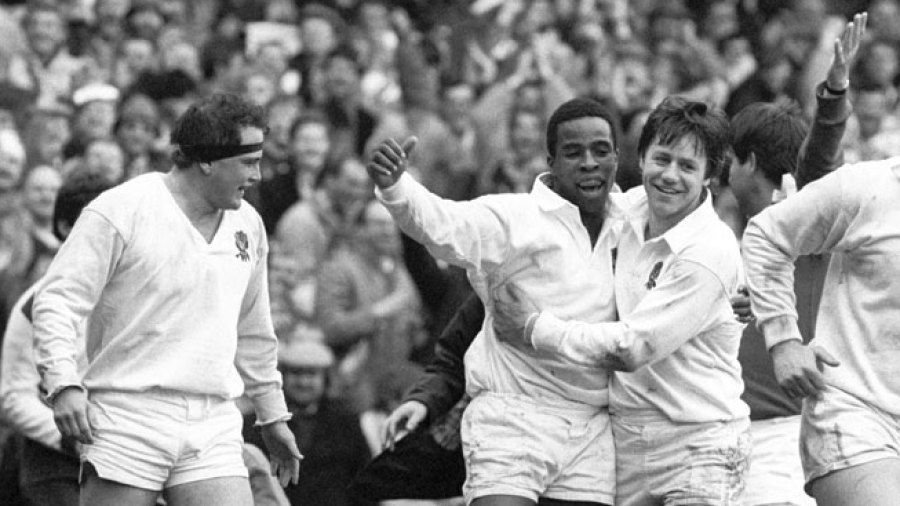March 19 down the years
Comin' for to carry Chris home
A band of angels comin' after me, Comin' for to carry me home ... Chris Oti celebrates his hat-trick on this day in 1988 © PA Photos
1988
The day Swing Low, Sweet Chariot became a Twickenham staple. At half time things were going wrong as England trailed and their captain, Nigel Melville, had been carried off with a broken leg. But a second half of 35 unanswered points gave England a 35-3 win, with Chris Oti scoring the first Five Nations hat-trick on the ground since 1924, all three tries in a 10 minute 43 second period. A group from the Benedictine school Douai started to sing a rugby club favourite - the gospel hymn Swing Low, Sweet Chariot - in honour of their new hero, the whole crowd joined in. Since then it was adopted as a regular song by the English team. Meanwhile, at Cardiff, Wales were pipped 10-9 by France and denied the Grand Slam.
2011 England traveled to Dublin for the final match of the Six Nations as they looked to secure their first Grand Slam in eight years. But they were given an almighty reality check as they were completely outplayed by an Ireland team that had lost to Wales and France already in the championship. Ireland won 24-8 with with Brian O'Driscoll scoring one of the tries to make him the leading try scorer in the tournament's history with 25. England's defeat gave Wales an outside chance of winning the tournament by beating France by more than 27 points in Paris, but the task proved as tough as it sounded and Wales went down to a 28-9 defeat. Scotland had earlier beaten Italy at Murrayfield to avoid the wooden spoon.
1994
England beat Wales at Twickenham in the 100th Test of the series but it was a mixed day for the home fans as the 15-8 margin was not enough to deprive Wales the Five Nations title - the first time that the Championship honours had officially decided by superior points difference. England had needed to win by a 16-point margin.
2000
Twenty-one year-old Brian O'Driscoll's try hat-trick and David Humphreys's late penalty goal brought Ireland their first Paris win against the French for 28 years and ended a 15-match losing streak against them. France led 22-14 going into the last quarter but Ireland capitalised on some dreadful defensive lapses to win 27-25. "I don't normally single out players," grinned veteran Mick Galwey, "but today was different. Brian was magnificent, out of this world. He was the difference between the two teams. Three tries in Paris is a mind-boggling achievement. I've only known the lad a few weeks, but I already recognise he is a very special talent. He is a world beater."
2005
Michael Owen led Wales to their first Grand Slam for 27 years as they beat Ireland 32-20 in the Millennium Stadium to achieve their first home win against the Irish since 1983. "A whole nation was imploring 15 men to erase years of relative sporting misery," reported the Mail On Sunday. "Two hours before kick-off the streets of Cardiff were awash with red as 250,000 rugby fans gathered in or around a stadium that was bursting at the seams."
1983
Another great day for Ireland as soldier-hooker Ciaran Fitzgerald led them to a 25-15 Dublin win over England and a share of the Five Nations championship. England had led 12-10 at the break but spurred on by news France had beaten Wales, the Irish upped their game and 12 points from the boot of Ollie Campbell in the first 16 minutes of the second-half sealed the win. The only negative was the desperate refereeing of Brian Anderson who allowed endless line-out infringements while Fergus Slattery's try was from a forward pass and was signalled with him on his back after being skilfully turned onto his back as he tried to ground the ball.
1977
Jacques Fouroux led France to their second Grand Slam, and it was perhaps one of the best. In the four matches they used 15 players and did not concede a try. In Dublin, the diminutive scrum-half formed an effective axis with Jean-Pierre Romeu and guided his side to a convincing 15-6 margin against Ireland.
1977
On the same day, Wales scored a dazzling try launched from their own half and finished off by their captain, Phil Bennett, to beat Scotland 18-9 at Murrayfield. The win clinched back-to-back Triple Crowns.
1938
The dawn of the TV era as Wilson Shaw led Scotland to a 21-16 Triple Crown victory at Twickenham in the first Championship match to be televised live. The Times noted the broadcast was a success and "there was no difficulty in distinguishing the players". The game was only broadcast in the London area and only the few thousand homes with sets were able to see the transmission. More than 70,000 packed Twickenham, including the King and Queen, and mounted police had to be used to keep control outside the ground.
1910
England's 14-5 victory against Scotland in Edinburgh brought them their first Championship outright since 1892. John Birkett captained a winning side in which Adrian Stoop was the guiding tactical genius at fly-half.
© Scrum.com


